英语介绍古代奥运起源
- 格式:doc
- 大小:24.50 KB
- 文档页数:2
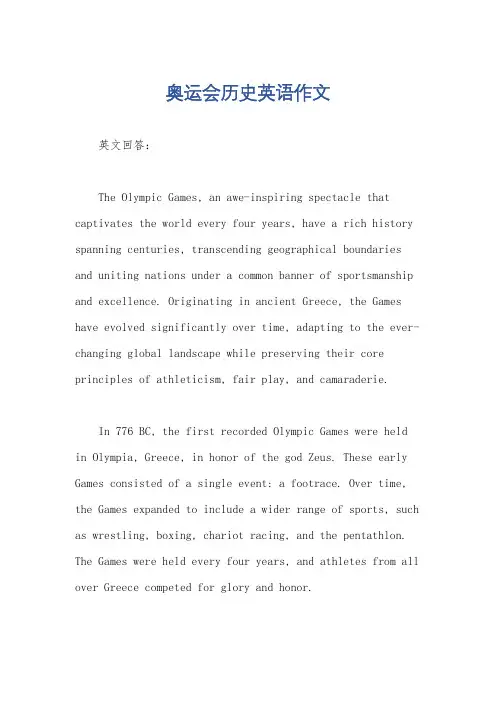
奥运会历史英语作文英文回答:The Olympic Games, an awe-inspiring spectacle that captivates the world every four years, have a rich history spanning centuries, transcending geographical boundaries and uniting nations under a common banner of sportsmanship and excellence. Originating in ancient Greece, the Games have evolved significantly over time, adapting to the ever-changing global landscape while preserving their core principles of athleticism, fair play, and camaraderie.In 776 BC, the first recorded Olympic Games were held in Olympia, Greece, in honor of the god Zeus. These early Games consisted of a single event: a footrace. Over time, the Games expanded to include a wider range of sports, such as wrestling, boxing, chariot racing, and the pentathlon. The Games were held every four years, and athletes from all over Greece competed for glory and honor.The Olympic Games were an integral part of Greek culture, and they played a significant role in the development of Greek society. The Games were a time for celebration and unity, and they provided a platform for athletes to showcase their skills and strength. The Games also served as a way to foster goodwill and peace among the competing nations.In the 4th century AD, the Olympic Games were banned by the Roman Emperor Theodosius I, who saw them as a pagan festival. The Games remained dormant for over 1,500 years, until they were revived in the late 19th century by Baron Pierre de Coubertin.Coubertin, a French educator and historian, wasinspired by the ancient Olympic Games and believed that they could play a positive role in the development of modern society. In 1894, he founded the International Olympic Committee (IOC), and two years later, the first modern Olympic Games were held in Athens, Greece.The modern Olympic Games have continued to grow andevolve over the past century, with the addition of new sports, the participation of more countries, and the introduction of new technologies. The Games have also faced challenges, such as boycotts, doping scandals, and security concerns. However, the Olympic spirit has remained strong, and the Games continue to be a symbol of hope, unity, and human achievement.The Olympic Games have had a profound impact on the world, both on and off the field of play. The Games have inspired countless athletes to achieve their dreams, and they have helped to promote peace and understanding among nations. The Olympic Games are a testament to the human spirit, and they continue to be an enduring symbol of unity and excellence.中文回答:奥林匹克运动会,每四年一次的惊心动魄的赛事,拥有跨越数个世纪的辉煌历史,它超越了地理界限,在体育精神和卓越成就的共同旗帜下团结各国。
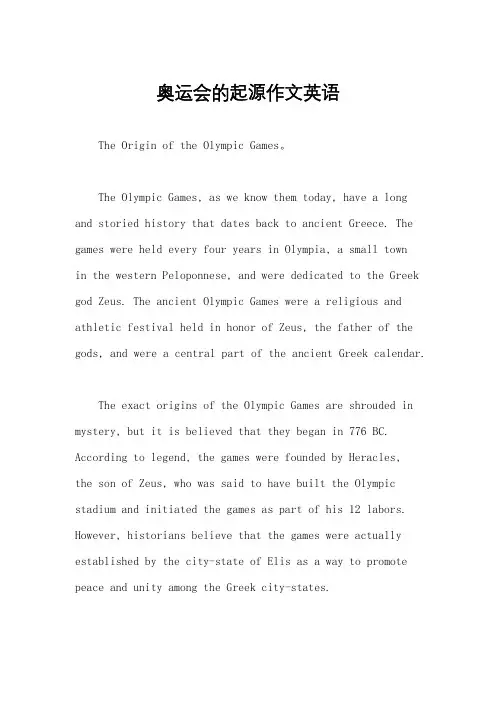
奥运会的起源作文英语The Origin of the Olympic Games。
The Olympic Games, as we know them today, have a long and storied history that dates back to ancient Greece. The games were held every four years in Olympia, a small townin the western Peloponnese, and were dedicated to the Greek god Zeus. The ancient Olympic Games were a religious and athletic festival held in honor of Zeus, the father of the gods, and were a central part of the ancient Greek calendar.The exact origins of the Olympic Games are shrouded in mystery, but it is believed that they began in 776 BC. According to legend, the games were founded by Heracles,the son of Zeus, who was said to have built the Olympic stadium and initiated the games as part of his 12 labors. However, historians believe that the games were actually established by the city-state of Elis as a way to promote peace and unity among the Greek city-states.The ancient Olympic Games were a time of great celebration and competition, with athletes from all over Greece coming to compete in a variety of events. The games included running, jumping, discus and javelin throwing, wrestling, boxing, and chariot racing, and were open to male athletes only. The victors of the games were awarded with a wreath of olive branches, which was a symbol of peace and victory in ancient Greece.The Olympic Games continued for nearly 12 centuries, until they were abolished by the Roman emperor Theodosius I in 393 AD. The games were seen as a pagan festival and were no longer in line with the Christian beliefs of the time. For over 1,500 years, the Olympic Games were forgotten, until they were revived in the late 19th century.The modern Olympic Games were founded by Baron Pierre de Coubertin, a French educator, who was inspired by the ancient games and sought to promote peace and understanding among nations. In 1896, the first modern Olympic Games were held in Athens, Greece, with 13 countries participating and 241 athletes competing in 43 events. Since then, theOlympic Games have grown in size and scope, with thousands of athletes from all over the world coming together to compete in a wide range of sports.Today, the Olympic Games are a symbol of unity and sportsmanship, with athletes from all walks of life coming together to compete on the world stage. The games continue to promote peace and understanding among nations, and serve as a reminder of the enduring legacy of the ancient Olympic Games. As we look forward to the future, the Olympic Games will continue to be a source of inspiration and pride for people all over the world.。
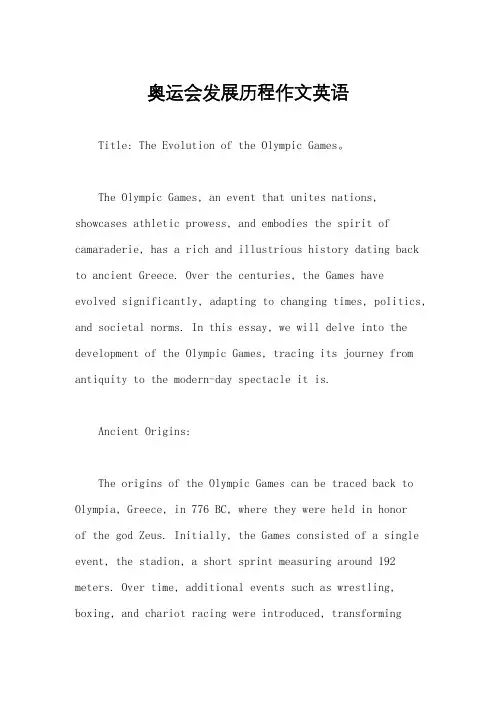
奥运会发展历程作文英语Title: The Evolution of the Olympic Games。
The Olympic Games, an event that unites nations, showcases athletic prowess, and embodies the spirit of camaraderie, has a rich and illustrious history dating back to ancient Greece. Over the centuries, the Games have evolved significantly, adapting to changing times, politics, and societal norms. In this essay, we will delve into the development of the Olympic Games, tracing its journey from antiquity to the modern-day spectacle it is.Ancient Origins:The origins of the Olympic Games can be traced back to Olympia, Greece, in 776 BC, where they were held in honorof the god Zeus. Initially, the Games consisted of a single event, the stadion, a short sprint measuring around 192 meters. Over time, additional events such as wrestling, boxing, and chariot racing were introduced, transformingthe Games into a multi-sport extravaganza.The ancient Olympics served as a platform for Greekcity-states to showcase their athletic prowess and foster a sense of unity among competing nations. Athletes competedin the nude to symbolize the purity of sport and to honor the gods. The Games were held every four years andattracted spectators from across the Greek world.Revival in the Modern Era:Following centuries of dormancy, the Olympic Games were revived in the late 19th century, thanks to the efforts of Baron Pierre de Coubertin, a French educator and sports enthusiast. Inspired by the ancient Games, de Coubertin envisioned an international sporting event that would promote peace and understanding among nations.The inaugural modern Olympics were held in Athens, Greece, in 1896, with athletes from 14 nationsparticipating in 43 events across nine sports. The Games were a resounding success, capturing the imagination of theworld and laying the foundation for future editions.Expansion and Innovation:Since its revival, the Olympic Games have undergone significant expansion and innovation. The number of participating nations has grown steadily, reflecting the global reach and appeal of the Games. New sports and disciplines have been added to the program, catering to the diverse interests and talents of athletes.One of the most significant developments in recent decades has been the inclusion of women's events across all sports. Initially excluded from many Olympic competitions, women now compete alongside their male counterparts on equal footing, showcasing their skills and athleticism on the world stage.Moreover, advancements in technology and infrastructure have transformed the Olympic experience for athletes and spectators alike. State-of-the-art venues, broadcasting technologies, and digital platforms have enhanced theaccessibility and visibility of the Games, allowingmillions of people around the world to participate and engage remotely.Challenges and Controversies:Despite its many successes, the Olympic Games have not been immune to challenges and controversies. Political tensions, commercialization, and allegations of doping have cast a shadow over certain editions of the Games, raising questions about their integrity and long-term viability.The decision to award hosting rights to certain countries has also been a source of controversy, with concerns raised about human rights abuses, environmental degradation, and economic exploitation. Nonetheless, the Olympic movement remains committed to its core values of excellence, friendship, and respect, striving to address these issues while upholding the spirit of fair play and inclusivity.Looking Ahead:As we look ahead to the future, the Olympic Games are poised to continue their evolution, adapting to the changing needs and expectations of athletes, fans, and society at large. Initiatives such as the Olympic Agenda 2020, aimed at promoting sustainability, youth engagement, and gender equality, are shaping the direction of the Games in the 21st century.Furthermore, the emergence of new technologies such as virtual reality, augmented reality, and esports presents exciting opportunities for the Olympic movement to innovate and expand its reach. By embracing these developments while staying true to its founding principles, the Olympic Games will remain a beacon of hope, inspiration, and unity for generations to come.Conclusion:In conclusion, the Olympic Games have come a long way since their humble beginnings in ancient Greece. From a local sporting festival to a global mega-event, the Gameshave transcended borders and cultures, bringing people together in celebration of human achievement and potential. As we reflect on the evolution of the Olympic Games, let us reaffirm our commitment to the values of friendship, solidarity, and fair play that define this remarkable institution.。
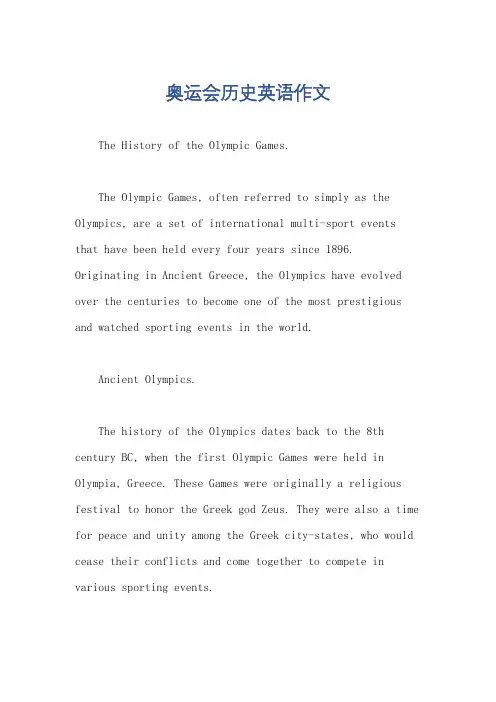
奥运会历史英语作文The History of the Olympic Games.The Olympic Games, often referred to simply as the Olympics, are a set of international multi-sport eventsthat have been held every four years since 1896.Originating in Ancient Greece, the Olympics have evolved over the centuries to become one of the most prestigious and watched sporting events in the world.Ancient Olympics.The history of the Olympics dates back to the 8th century BC, when the first Olympic Games were held in Olympia, Greece. These Games were originally a religious festival to honor the Greek god Zeus. They were also a time for peace and unity among the Greek city-states, who would cease their conflicts and come together to compete in various sporting events.The Ancient Olympics included a range of events such as wrestling, running, jumping, boxing, and chariot racing. Only male competitors from Greece were allowed to participate, and the Games were held every four years in a cycle known as the Olympiad. The Games continued for over a thousand years, becoming a significant cultural and social event in Ancient Greece.Modern Olympics.The concept of modern Olympic Games was revived in the late 19th century by a French nobleman named Pierre de Coubertin. Inspired by the Ancient Olympics, Coubertin believed that sport could promote peace and unity among nations. In 1894, he founded the International Olympic Committee (IOC) with the aim of organizing modern Olympic Games.The first modern Olympic Games were held in Athens, Greece, in 1896. These Games included events such as athletics, swimming, gymnastics, and weightlifting. Unlike the Ancient Olympics, the modern Games were open to maleand female competitors from all over the world.The modern Olympics have grown significantly sincetheir inception. The number of participating countries and the range of events have expanded, and the Games now include events such as basketball, soccer, tennis, and even e-sports. The Olympics have also become a major economic event, with billions of dollars being generated through ticket sales, sponsorships, and broadcast rights.Impact of the Olympics.The Olympics have had a profound impact on sport and society. They have provided a platform for athletes from around the world to compete at the highest level, inspiring generations of young people to pursue excellence in sport. The Games have also been a catalyst for social change, promoting inclusivity and diversity in sport.The Olympics have also been a significant driver of infrastructure development and tourism in host cities. The construction of stadiums, arenas, and other facilities hasoften transformed these cities, and the Games haveattracted millions of visitors and broadcast viewers from around the globe.Challenges and Controversies.Despite their positive impacts, the Olympics have also faced challenges and controversies. One of the most significant issues is the cost of hosting the Games, which can run into billions of dollars. This has led to criticism that the Olympics are too expensive and elitist, excluding smaller and poorer nations.Another issue is the impact of the Games on the environment. Host cities often face significant environmental challenges, including air pollution, deforestation, and water scarcity. This has led to callsfor more sustainable and environmentally friendly Olympic Games.The Olympics have also been criticized for their political involvement. In some cases, host countries havebeen accused of using the Games to promote their own political agendas or suppress dissent. This has led to protests and demonstrations during the Games, calling for greater political neutrality.Conclusion.The Olympic Games are a unique and remarkable phenomenon in the world of sport. They have a rich history that dates back to Ancient Greece and have evolved over the centuries to become one of the most significant and watched sporting events in the world. The Games have provided a platform for athletes to compete at the highest level, inspiring generations of young people and promoting unity and peace among nations.However, the Olympics have also faced challenges and controversies. The cost of hosting the Games, their environmental impact, and their political involvement have all been issues that have been debated and criticized. Despite these challenges, the Olympics continue tocaptivate the world and remain a symbol of unity, peace, and excellence in sport.。
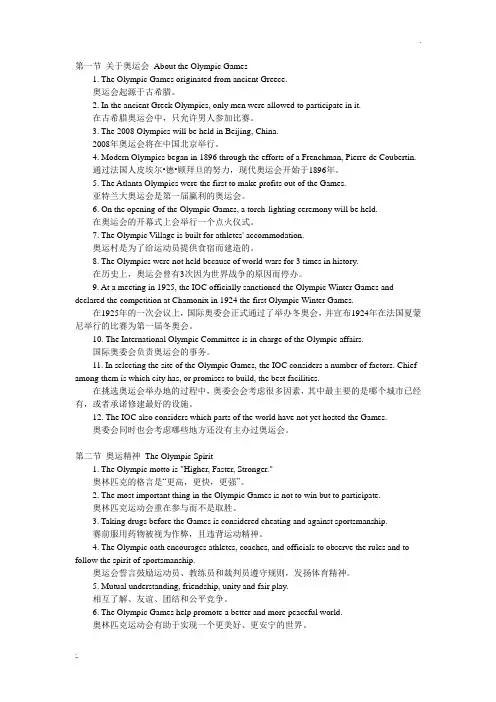
第一节关于奥运会About the Olympic Games1. The Olympic Games originated from ancient Greece.奥运会起源于古希腊。
2. In the ancient Greek Olympics, only men were allowed to participate in it.在古希腊奥运会中,只允许男人参加比赛。
3. The 2008 Olympics will be held in Beijing, China.2008年奥运会将在中国北京举行。
4. Modern Olympics began in 1896 through the efforts of a Frenchman, Pierre de Coubertin.通过法国人皮埃尔•德•顾拜旦的努力,现代奥运会开始于1896年。
5. The Atlanta Olympics were the first to make profits out of the Games.亚特兰大奥运会是第一届赢利的奥运会。
6. On the opening of the Olympic Games, a torch-lighting ceremony will be held.在奥运会的开幕式上会举行一个点火仪式。
7. The Olympic Village is built for athletes' accommodation.奥运村是为了给运动员提供食宿而建造的。
8. The Olympics were not held because of world wars for 3 times in history.在历史上,奥运会曾有3次因为世界战争的原因而停办。
9. At a meeting in 1925, the IOC officially sanctioned the Olympic Winter Games and declared the competition at Chamonix in 1924 the first Olympic Winter Games.在1925年的一次会议上,国际奥委会正式通过了举办冬奥会,并宣布1924年在法国夏蒙尼举行的比赛为第一届冬奥会。
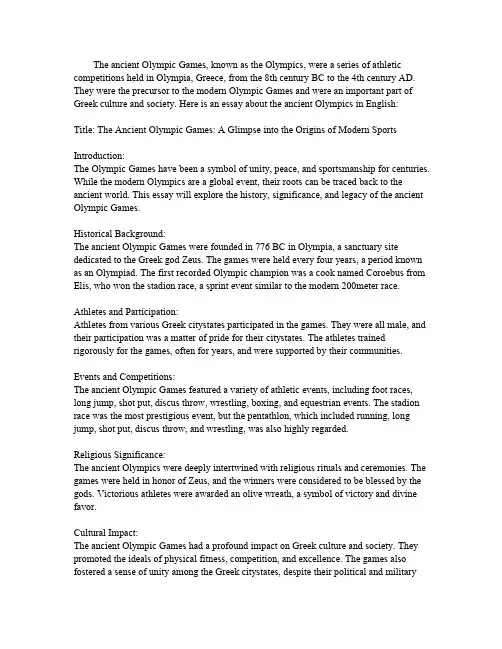
The ancient Olympic Games,known as the Olympics,were a series of athletic competitions held in Olympia,Greece,from the8th century BC to the4th century AD. They were the precursor to the modern Olympic Games and were an important part of Greek culture and society.Here is an essay about the ancient Olympics in English:Title:The Ancient Olympic Games:A Glimpse into the Origins of Modern SportsIntroduction:The Olympic Games have been a symbol of unity,peace,and sportsmanship for centuries. While the modern Olympics are a global event,their roots can be traced back to the ancient world.This essay will explore the history,significance,and legacy of the ancient Olympic Games.Historical Background:The ancient Olympic Games were founded in776BC in Olympia,a sanctuary site dedicated to the Greek god Zeus.The games were held every four years,a period known as an Olympiad.The first recorded Olympic champion was a cook named Coroebus from Elis,who won the stadion race,a sprint event similar to the modern200meter race. Athletes and Participation:Athletes from various Greek citystates participated in the games.They were all male,and their participation was a matter of pride for their citystates.The athletes trained rigorously for the games,often for years,and were supported by their communities. Events and Competitions:The ancient Olympic Games featured a variety of athletic events,including foot races, long jump,shot put,discus throw,wrestling,boxing,and equestrian events.The stadion race was the most prestigious event,but the pentathlon,which included running,long jump,shot put,discus throw,and wrestling,was also highly regarded.Religious Significance:The ancient Olympics were deeply intertwined with religious rituals and ceremonies.The games were held in honor of Zeus,and the winners were considered to be blessed by the gods.Victorious athletes were awarded an olive wreath,a symbol of victory and divine favor.Cultural Impact:The ancient Olympic Games had a profound impact on Greek culture and society.They promoted the ideals of physical fitness,competition,and excellence.The games also fostered a sense of unity among the Greek citystates,despite their political and militaryrivalries.Decline and Legacy:The ancient Olympic Games declined in the4th century AD due to various factors, including political instability,economic decline,and the rise of Christianity,which viewed the games as a pagan ritual.However,the spirit of the ancient Olympics lived on, and in1896,the modern Olympic Games were revived in Athens,Greece. Conclusion:The ancient Olympic Games were a significant part of Greek culture and history.They embodied the values of sportsmanship,competition,and excellence that continue to inspire athletes and spectators around the world today.The legacy of the ancient Olympics endures,reminding us of the power of sports to bring people together and promote peace and understanding.In conclusion,the ancient Olympic Games were a remarkable event that laid the foundation for the modern Olympic Games.They were not only a celebration of athletic prowess but also a testament to the cultural,religious,and social values of ancient Greece. Understanding the history and significance of the ancient Olympics helps us appreciate the rich heritage of the Olympic movement and its enduring impact on the world of sports.。
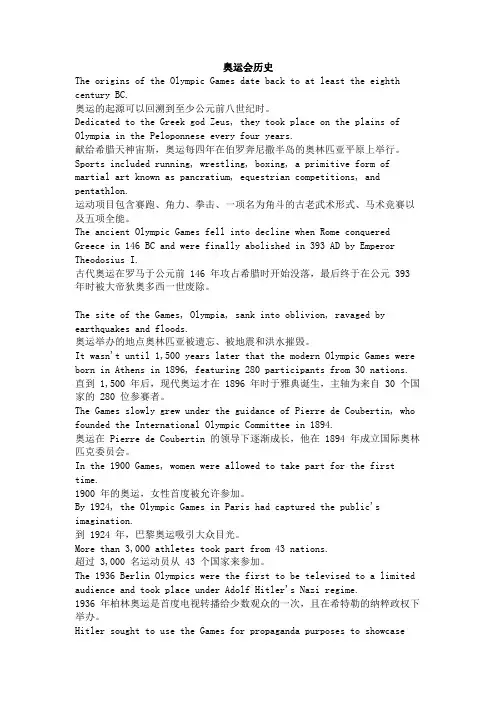
奥运会历史The origins of the Olympic Games date back to at least the eighth century BC.奥运的起源可以回溯到至少公元前八世纪时。
Dedicated to the Greek god Zeus, they took place on the plains of Olympia in the Peloponnese every four years.献给希腊天神宙斯,奥运每四年在伯罗奔尼撒半岛的奥林匹亚平原上举行。
Sports included running, wrestling, boxing, a primitive form of martial art known as pancratium, equestrian competitions, and pentathlon.运动项目包含赛跑、角力、拳击、一项名为角斗的古老武术形式、马术竞赛以及五项全能。
The ancient Olympic Games fell into decline when Rome conquered Greece in 146 BC and were finally abolished in 393 AD by Emperor Theodosius I.古代奥运在罗马于公元前 146 年攻占希腊时开始没落,最后终于在公元 393 年时被大帝狄奥多西一世废除。
The site of the Games, Olympia, sank into oblivion, ravaged by earthquakes and floods.奥运举办的地点奥林匹亚被遗忘、被地震和洪水摧毁。
It wasn't until 1,500 years later that the modern Olympic Games were born in Athens in 1896, featuring 280 participants from 30 nations. 直到 1,500 年后,现代奥运才在 1896 年时于雅典诞生,主轴为来自 30 个国家的 280 位参赛者。
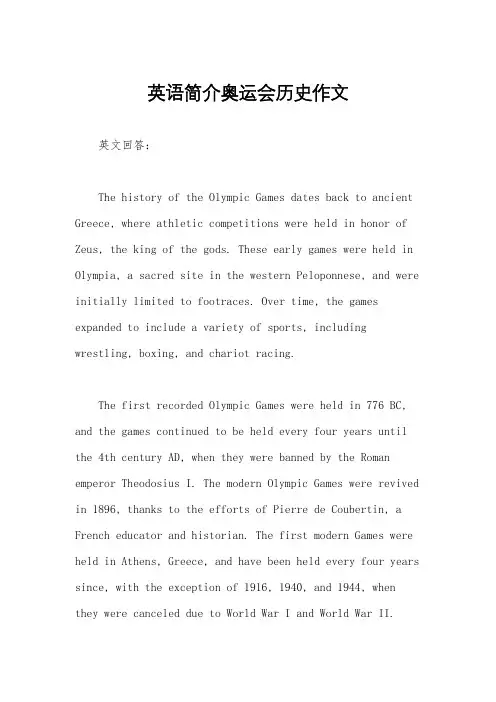
英语简介奥运会历史作文英文回答:The history of the Olympic Games dates back to ancient Greece, where athletic competitions were held in honor of Zeus, the king of the gods. These early games were held in Olympia, a sacred site in the western Peloponnese, and were initially limited to footraces. Over time, the games expanded to include a variety of sports, including wrestling, boxing, and chariot racing.The first recorded Olympic Games were held in 776 BC, and the games continued to be held every four years until the 4th century AD, when they were banned by the Roman emperor Theodosius I. The modern Olympic Games were revived in 1896, thanks to the efforts of Pierre de Coubertin, a French educator and historian. The first modern Games were held in Athens, Greece, and have been held every four years since, with the exception of 1916, 1940, and 1944, when they were canceled due to World War I and World War II.The Olympic Games have grown to become the world's largest sporting event, with athletes from over 200countries competing in over 30 sports. The Games are a celebration of human achievement and a symbol of unity and friendship among nations.Here are some interesting facts about the Olympic Games:The Olympic flame is lit in Olympia, Greece, and then carried by torchbearers to the host city.The Olympic motto is "Citius, Altius, Fortius," which means "Faster, Higher, Stronger."The Olympic rings represent the five continents of the world.The Olympic Games have been held in 28 differentcities around the world.The most successful Olympian is Michael Phelps, aswimmer from the United States, who has won 28 Olympic medals.中文回答:奥运会起源于古希腊,运动员们举行竞技比赛以向宙斯,众神之王致敬。
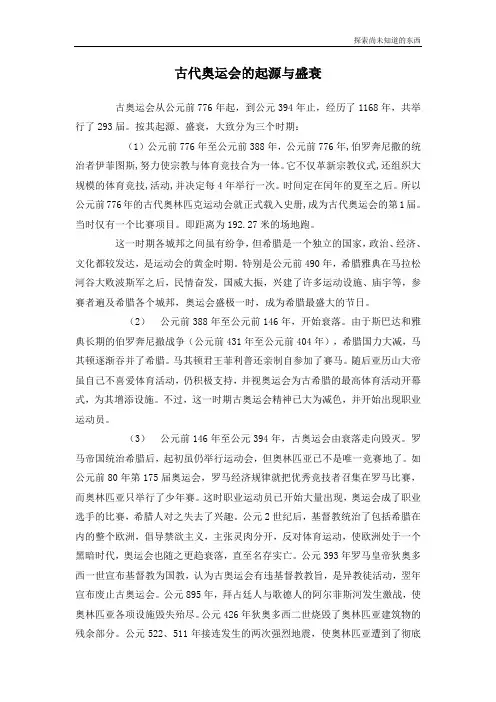
古代奥运会的起源与盛衰古奥运会从公元前776年起,到公元394年止,经历了1168年,共举行了293届。
按其起源、盛衰,大致分为三个时期:(1)公元前776年至公元前388年,公元前776年,伯罗奔尼撒的统治者伊菲图斯,努力使宗教与体育竞技合为一体。
它不仅革新宗教仪式,还组织大规模的体育竞技,活动,并决定每4年举行一次。
时间定在闰年的夏至之后。
所以公元前776年的古代奥林匹克运动会就正式载入史册,成为古代奥运会的第1届。
当时仅有一个比赛项目。
即距离为192.27米的场地跑。
这一时期各城邦之间虽有纷争,但希腊是一个独立的国家,政治、经济、文化都较发达,是运动会的黄金时期。
特别是公元前490年,希腊雅典在马拉松河谷大败波斯军之后,民情奋发,国威大振,兴建了许多运动设施、庙宇等,参赛者遍及希腊各个城邦,奥运会盛极一时,成为希腊最盛大的节日。
(2)公元前388年至公元前146年,开始衰落。
由于斯巴达和雅典长期的伯罗奔尼撤战争(公元前431年至公元前404年),希腊国力大减,马其顿逐渐吞并了希腊。
马其顿君王菲利普还亲制自参加了赛马。
随后亚历山大帝虽自己不喜爱体育活动,仍积极支持,并视奥运会为古希腊的最高体育活动开幕式,为其增添设施。
不过,这一时期古奥运会精神已大为减色,并开始出现职业运动员。
(3)公元前146年至公元394年,古奥运会由衰落走向毁灭。
罗马帝国统治希腊后,起初虽仍举行运动会,但奥林匹亚已不是唯一竞赛地了。
如公元前80年第175届奥运会,罗马经济规律就把优秀竞技者召集在罗马比赛,而奥林匹亚只举行了少年赛。
这时职业运动员已开始大量出现,奥运会成了职业选手的比赛,希腊人对之失去了兴趣。
公元2世纪后,基督教统治了包括希腊在内的整个欧洲,倡导禁欲主义,主张灵肉分开,反对体育运动,使欧洲处于一个黑暗时代,奥运会也随之更趋衰落,直至名存实亡。
公元393年罗马皇帝狄奥多西一世宣布基督教为国教,认为古奥运会有违基督教教旨,是异教徒活动,翌年宣布废止古奥运会。
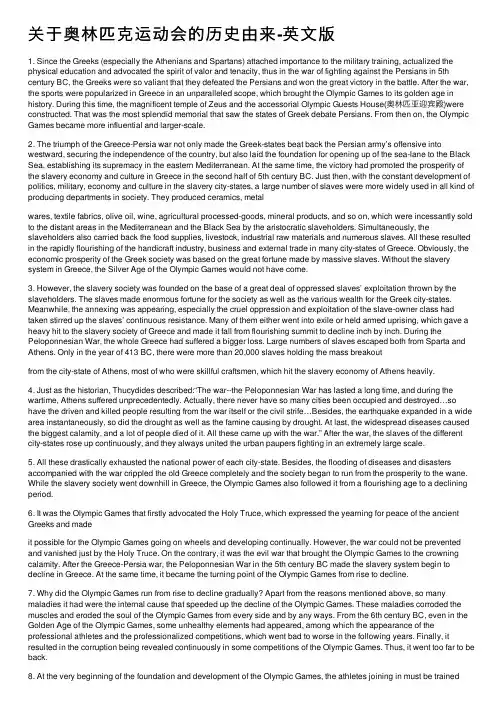
关于奥林匹克运动会的历史由来-英⽂版1. Since the Greeks (especially the Athenians and Spartans) attached importance to the military training, actualized the physical education and advocated the spirit of valor and tenacity, thus in the war of fighting against the Persians in 5th century BC, the Greeks were so valiant that they defeated the Persians and won the great victory in the battle. After the war, the sports were popularized in Greece in an unparalleled scope, which brought the Olympic Games to its golden age in history. During this time, the magnificent temple of Zeus and the accessorial Olympic Guests House(奥林匹亚迎宾殿)were constructed. That was the most splendid memorial that saw the states of Greek debate Persians. From then on, the Olympic Games became more influential and larger-scale.2. The triumph of the Greece-Persia war not only made the Greek-states beat back the Persian army’s offensive into westward, securing the independence of the country, but also laid the foundation for opening up of the sea-lane to the Black Sea, establishing its supremacy in the eastern Mediterranean. At the same time, the victory had promoted the prosperity of the slavery economy and culture in Greece in the second half of 5th century BC. Just then, with the constant development of politics, military, economy and culture in the slavery city-states, a large number of slaves were more widely used in all kind of producing departments in society. They produced ceramics, metalwares, textile fabrics, olive oil, wine, agricultural processed-goods, mineral products, and so on, which were incessantly sold to the distant areas in the Mediterranean and the Black Sea by the aristocratic slaveholders. Simultaneously, the slaveholders also carried back the food supplies, livestock, industrial raw materials and numerous slaves. All these resulted in the rapidly flourishing of the handicraft industry, business and external trade in many city-states of Greece. Obviously, the economic prosperity of the Greek society was based on the great fortune made by massive slaves. Without the slavery system in Greece, the Silver Age of the Olympic Games would not have come.3. However, the slavery society was founded on the base of a great deal of oppressed slaves’ exploitation thrown by the slaveholders. The slaves made enormous fortune for the society as well as the various wealth for the Greek city-states. Meanwhile, the annexing was appearing, especially the cruel oppression and exploitation of the slave-owner class had taken stirred up the slaves’ continuous resistance. Many of them either went into exile or held armed uprising, which gave a heavy hit to the slavery society of Greece and made it fall from flourishing summit to decline inch by inch. During the Peloponnesian War, the whole Greece had suffered a bigger loss. Large numbers of slaves escaped both from Sparta and Athens. Only in the year of 413 BC, there were more than 20,000 slaves holding the mass breakoutfrom the city-state of Athens, most of who were skillful craftsmen, which hit the slavery economy of Athens heavily.4. Just as the historian, Thucydides described:“The war--the Peloponnesian War has lasted a long time, and during the wartime, Athens suffered unprecedentedly. Actually, there never have so many cities been occupied and destroyed…so have the driven and killed people resulting from the war itself or the civil strife…Besides, the earthquake expanded in a wide area instantaneously, so did the drought as well as the famine causing by drought. At last, the widespread diseases caused the biggest calamity, and a lot of people died of it. All these came up with the war.” After the war, the slaves of the different city-states rose up continuously, and they always united the urban paupers fighting in an extremely large scale.5. All these drastically exhausted the national power of each city-state. Besides, the flooding of diseases and disasters accompanied with the war crippled the old Greece completely and the society began to run from the prosperity to the wane. While the slavery society went downhill in Greece, the Olympic Games also followed it from a flourishing age to a declining period.6. It was the Olympic Games that firstly advocated the Holy Truce, which expressed the yearning for peace of the ancient Greeks and madeit possible for the Olympic Games going on wheels and developing continually. However, the war could not be prevented and vanished just by the Holy Truce. On the contrary, it was the evil war that brought the Olympic Games to the crowning calamity. After the Greece-Persia war, the Peloponnesian War in the 5th century BC made the slavery system begin to decline in Greece. At the same time, it became the turning point of the Olympic Games from rise to decline.7. Why did the Olympic Games run from rise to decline gradually? Apart from the reasons mentioned above, so many maladies it had were the internal cause that speeded up the decline of the Olympic Games. These maladies corroded the muscles and eroded the soul of the Olympic Games from every side and by any ways. From the 6th century BC, even in the Golden Age of the Olympic Games, some unhealthy elements had appeared, among which the appearance of the professional athletes and the professionalized competitions, which went bad to worse in the following years. Finally, it resulted in the corruption being revealed continuously in some competitions of the Olympic Games. Thus, it went too far to be back.8. At the very beginning of the foundation and development of the Olympic Games, the athletes joining in must be trainedstrictly. Once winning in the competition, they would gain all kinds of glories after that. At first, the kings, slaveholders and aristocrats often participated insome competitions. Relatively, the slaveholders and aristocrats usually paid special attention to the strict and hard training and spared no effort in the games. But the following games were imprinted by the ages deeply along with the slavery society going from prosperity to decline in Greece.。
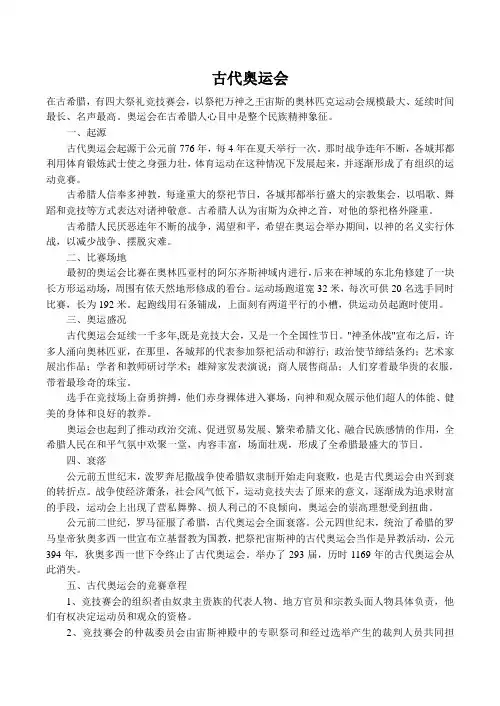
古代奥运会在古希腊,有四大祭礼竞技赛会,以祭祀万神之王宙斯的奥林匹克运动会规模最大、延续时间最长、名声最高。
奥运会在古希腊人心目中是整个民族精神象征。
一、起源古代奥运会起源于公元前776年,每4年在夏天举行一次。
那时战争连年不断,各城邦都利用体育锻炼武士使之身强力壮,体育运动在这种情况下发展起来,并逐渐形成了有组织的运动竞赛。
古希腊人信奉多神教,每逢重大的祭祀节日,各城邦都举行盛大的宗教集会,以唱歌、舞蹈和竞技等方式表达对诸神敬意。
古希腊人认为宙斯为众神之首,对他的祭祀格外隆重。
古希腊人民厌恶连年不断的战争,渴望和平,希望在奥运会举办期间,以神的名义实行休战,以减少战争、摆脱灾难。
二、比赛场地最初的奥运会比赛在奥林匹亚村的阿尔齐斯神域内进行,后来在神域的东北角修建了一块长方形运动场,周围有依天然地形修成的看台。
运动场跑道宽32米,每次可供20名选手同时比赛,长为192米。
起跑线用石条铺成,上面刻有两道平行的小槽,供运动员起跑时使用。
三、奥运盛况古代奥运会延续一千多年,既是竞技大会,又是一个全国性节日。
"神圣休战"宣布之后,许多人涌向奥林匹亚,在那里,各城邦的代表参加祭祀活动和游行;政治使节缔结条约;艺术家展出作品;学者和教师研讨学术;雄辩家发表演说;商人展售商品;人们穿着最华贵的衣服,带着最珍奇的珠宝。
选手在竞技场上奋勇拚搏,他们赤身裸体进入赛场,向神和观众展示他们超人的体能、健美的身体和良好的教养。
奥运会也起到了推动政治交流、促进贸易发展、繁荣希腊文化、融合民族感情的作用,全希腊人民在和平气氛中欢聚一堂,内容丰富,场面壮观,形成了全希腊最盛大的节日。
四、衰落公元前五世纪末,泼罗奔尼撒战争使希腊奴隶制开始走向衰败,也是古代奥运会由兴到衰的转折点。
战争使经济萧条,社会风气低下,运动竞技失去了原来的意义,逐渐成为追求财富的手段,运动会上出现了营私舞弊、损人利己的不良倾向,奥运会的崇高理想受到扭曲。
英语简介奥运会历史作文Title: A Brief History of the Olympic Games。
The Olympic Games, a pinnacle of athletic prowess and international camaraderie, trace their origins back to ancient Greece. In this essay, we will delve into the rich tapestry of Olympic history, from its inception to the modern-day spectacle it has become.The ancient Olympic Games were first held in Olympia, Greece, around 776 BCE, as part of a religious festival honoring the Greek god Zeus. These games were a celebration of physical strength, agility, and prowess, and athletes from various Greek city-states would gather to compete in events such as running, wrestling, boxing, and chariot racing. The Games held significant cultural and political importance, fostering a sense of unity among the Greekcity-states and serving as a platform for diplomatic dialogue and resolution of conflicts.However, the ancient Olympics eventually declined in significance and were abolished in 393 CE by the Roman Emperor Theodosius I, who deemed them as pagan rituals incompatible with Christianity. For centuries, the Olympic Games remained dormant, relegated to the annals of history.It wasn't until the late 19th century that the Olympic Games were revived, thanks to the efforts of French educator Baron Pierre de Coubertin. Inspired by the ancient Olympics and motivated by a desire to promote peace and understanding among nations, Coubertin spearheaded the revival of the Games. In 1896, the first modern Olympic Games were held in Athens, Greece, marking the beginning of a new era in sports and international cooperation.Since then, the Olympic Games have evolved into a global phenomenon, transcending borders, cultures, and languages. The Games have grown in scale and scope, with thousands of athletes from hundreds of countries competing in a diverse array of sports. The ideals of Olympism—excellence, friendship, and respect—continue to guide the Olympic movement, serving as a beacon of hope andinspiration for people around the world.Throughout its history, the Olympic Games have weathered numerous challenges, including two world wars, political boycotts, and controversies over doping and corruption. Yet, despite these obstacles, the Games have persevered, demonstrating the enduring power of sport to unite and inspire humanity.In addition to the Summer Olympics, which feature awide range of sports including track and field, gymnastics, swimming, and basketball, the Olympic movement also encompasses the Winter Olympics, which showcase sports such as skiing, ice skating, and snowboarding. Both the Summer and Winter Games are held on a quadrennial basis,alternating every two years.In recent decades, the Olympic Games have also become a platform for promoting social and environmental sustainability. Initiatives such as the Olympic Truce,which calls for a cessation of hostilities during the Games, and the inclusion of sustainability criteria in theplanning and execution of the Games, reflect the Olympic movement's commitment to making a positive impact on the world beyond the realm of sports.Looking ahead, the Olympic Games continue to inspire awe and wonder, captivating audiences around the globe with moments of triumph, heartbreak, and unity. As the world continues to evolve, so too will the Olympic movement, adapting to new challenges and opportunities whileremaining true to its core values of excellence, friendship, and respect.In conclusion, the Olympic Games represent a timeless celebration of human achievement and cooperation, bridging the past, present, and future. From its humble beginningsin ancient Greece to its status as a global phenomenon in the 21st century, the Olympic Games embody the enduringspirit of athleticism, sportsmanship, and unity. As we look towards the future, let us embrace the Olympic ideals and strive to build a world where peace, solidarity, and mutual understanding reign supreme.。
希腊雅典历史之奥林匹亚运动会的起源The Origin of the Olympic Games in Ancient Athens,GreeceThe cradle of civilization is often traced back to ancient Greece, a land that birthed not only profound philosophical ideas but also the world-renowned Olympic Games. These two seemingly disparate entities are intimately intertwined in Greek history and culture, forming a unique narrative that continues to resonate across time.追溯文明的摇篮,我们总会回到古希腊——这片孕育了深刻哲学思想和举世闻名的奥林匹克运动会的土地。
在希腊的历史与文化中,这两者似乎截然不同却又紧密相连,构成了一段独特的叙事,经久不衰地回响着。
Deep within the heart of ancient Athens, nestled among rolling hills and lush greenery, was the sacred site known as Olympia. It was here where the first rays of dawn would greet the rising sun, casting its golden glow upon the altars and temples dedicated to the gods. This serene setting provided the perfect backdrop for what would become one of the most enduring symbols of human unity - the Olympic Games.古雅典的心脏深处,有一片位于连绵起伏的山丘和郁郁葱葱的绿地之中的神圣之地——奥林匹亚。
关于奥运会的英语介绍1The Olympic Games, a global spectacle that has captivated the hearts and minds of people for centuries, holds a significant place in the history of human civilization.The ancient Olympic Games originated in ancient Greece and were closely associated with religious rituals. They were characterized by a spirit of competition and honor among athletes. However, with the passage of time, they faded into history.In the modern era, the Olympic Games were revived and have undergone numerous changes. They have grown into a massive international event that brings together athletes from all corners of the world. The Olympics not only showcase the highest level of athletic prowess but also play a crucial role in promoting international friendship. Athletes from different countries come together, competing on the same stage, fostering mutual understanding and respect.Moreover, the Olympic Games have greatly contributed to the development of sports worldwide. They inspire people to engage in physical activities and pursue excellence. They also provide a platform for the exchange of sports knowledge and techniques.Most importantly, the Olympics represent the indomitable humanspirit. Athletes overcome countless challenges and obstacles, demonstrating perseverance, determination, and the pursuit of victory. It is a celebration of human potential and the power of unity.In conclusion, the Olympic Games are not just a sports event but a symbol of hope, unity, and progress for humanity.2The Olympic Games are a global spectacle that showcases the peak of human physical and mental prowess. The variety of events is truly astonishing. Athletics, for instance, witnesses athletes sprinting at breathtaking speeds, leaping over great distances, and throwing objects with tremendous force. In swimming, competitors slice through the water with grace and power, striving for those precious fractions of a second that separate victory from defeat. Gymnastics is a display of elegance and strength, as athletes perform breathtaking flips and twists in the air.The spirit of the athletes is truly inspiring. They train for years, sacrificing their time and energy, facing countless setbacks and challenges. They push their bodies to the limit, driven by their passion for the sport and the pursuit of glory and dreams. Take the story of Usain Bolt, who overcame numerous obstacles to become the fastest man on earth. Or the perseverance of Simone Biles in gymnastics, constantly perfecting her routines.The Olympic Games are not just about winning medals; they are aboutthe determination, the hard work, and the unwavering commitment of athletes from all over the world. They inspire us to reach for our own goals and to never give up in the face of adversity.3The Olympic Games are one of the most significant international sports events that bring about remarkable changes to the host cities. Take Beijing, for example. When it hosted the Olympics, the city underwent tremendous transformations. New sports venues and facilities were constructed, providing citizens with more places for exercise and entertainment. The transportation system was greatly improved, with expanded subway lines and better roads, easing traffic congestion. Moreover, the event enhanced Beijing's international reputation significantly. It attracted worldwide attention and showcased the city's rich culture and modern development to the global audience. The Olympics also spurred economic growth, creating numerous job opportunities and boosting tourism. Infrastructures like hotels and restaurants were upgraded to meet the demands of the influx of tourists. The Olympics is not just a sports event; it is a catalyst for the comprehensive development of the host city. It leaves a lasting legacy that benefits the residents and contributes to the city's long-term progress.The Olympic Games are a global celebration of sportsmanship, unity, and cultural exchange. The opening and closing ceremonies of the Olympics are always spectacular showcases of human creativity and diversity.The opening ceremony often features a grand parade of athletes from different nations, each representing their unique identities and pride. The elaborate stage designs, combined with breathtaking light shows and music performances, create an atmosphere of excitement and anticipation. For instance, the Beijing Olympics' opening ceremony presented a magnificent display of traditional Chinese culture, with its exquisite dance routines and stunning fireworks.The closing ceremony is no less impressive. It is a time to celebrate the achievements and friendships forged during the games. Beautiful choreographies and heartwarming moments of athletes coming together symbolize the spirit of unity and sportsmanship. The Rio Olympics' closing ceremony, with its vibrant samba dances and colorful costumes, left a lasting impression on the world.These ceremonies not only showcase the cultural heritage of the host country but also emphasize the common values that bind us all together. They are a reminder of the power of sports to unite people from different corners of the world in a spirit of peace and harmony.The Olympic Games, a global spectacle that transcends boundaries and unites the world, embody values that are not only profound but also have a far-reaching impact on society. At its core, the Olympics advocate for peace. In a world often marred by conflicts, the Olympic stage provides a neutral ground where athletes from diverse nations come together, setting aside political and territorial disputes. This spirit of peaceful coexistence is exemplified when rivals shake hands and embrace after a fierce competition.Fair competition is another pillar of the Olympics. Every athlete is given an equal opportunity to showcase their skills and talents, judged based on merit and performance alone. This principle serves as a model for society, promoting justice and integrity in all walks of life.The Olympics also foster unity and collaboration. Teams from different countries train and compete together, sharing experiences and learning from one another. This exchange breaks down barriers and builds bridges among nations, contributing to a more inclusive and harmonious world.Furthermore, the Olympics play a crucial role in eliminating discrimination. Athletes of all races, genders, and backgrounds have the chance to shine, proving that success is not determined by one's identity but by hard work and dedication. This helps to shift societal perspectivesand promotes equality.In conclusion, the Olympic Games are not merely a sporting event but a powerful force for positive change, inspiring generations and shaping a better world through the values it upholds.。
英语介绍古代奥运起源The Olynpic GamesThe Olympic Games, first held in 776BC, has a history of more than on e thousand yiars. The Games is held every four years.Many countries try their best to bid forhosting the Olympic Games. And every country does its best to get more medals in the Games. In 2000, the city of Sidney held the 27th Olympic Games. Over one hundred cou ntries all over the world took part in it. We won 28gold medals that year. China, a major sport country, will hold the 29th Olympic Games in 200 8. People from all walks of life are participating in various activities and making good preparations for it.There are five rings on the Olympic flag, which are considered to symbo lize, the five continents: Europe, Asia, Africa, Australia and America. The Olympic motto is: "Swifter, higher, stronger." The Games can promote t he understanding and friendship among different peoples and different na tions.奥林匹克运动会公元前776年首次举办的奥运会,已经有一千多年的历史了。
As the Chinese people, we should be proud of, because the Olympic Games to be grand in our countries, so everyone is looking forward to the arrival of the Olympic Games, then let us have a better understanding of the Olympic Games it.1, the origins of the Olympic Games: Greeks in 776 BC provisions in Olympia every four years hold a Games. Until the year 394, Roman emperor was prohibited. 1875-1881, the German bank Di Wusi in the Olympic sites to explore the Archaeological Finds, has aroused worldwide interest. To this end, the French educator Pierre de Coubertin, should restore the ancient Greek tradition of the Olympic Games. So in June 1894 in Paris held its first international sports General Assembly, and in April 1896 in the Greek capital of Athens held the first modern Olympic Games.The world's most widely circulated to several Olympic rings logo, with the development of the Olympic movement, it has become a culture of the Olympic spirit and the image of representatives of the five ring "to" go, the Olympic movement to take root where flowering.Speaking of the origins of rings, we have had such an interesting story. 1936 Berlin Olympic Games of the 11th the first time held the torchrelay, the torch transmission line from Olympia, Greece from the north exit, along the Danube through Austria, the last to enter Germany. In order to heighten the symbolic significance of this activity, the Olympic Games Organizing Committee Chairman Carl •Dimu and his colleagues almost entirely in accordance with the ancient Olympic Games to the scene along the layout of the ancient Greek ruins. The torch arrived Deerfeimo SARS Hill, the ancient stadium at a special ceremony to be held and when that happens, Dimu whimsical turns, in about three feet of a high rectangular stones inscribed on all sides of the design and the modern Olympic movement rings signs, the ancient stadium on one end of the starting line. After the ceremony, the torch to the north, and the stones of this props were to remain in the ancient stadium.Since very few people know this piece of stone engraved with the five ring logo (later known as "Dimu stone") the true identity and, thereafter, for a very long time, it was as a "3,000-year-old remains of the ancient Olympic Games" . Siechuane this mistake until the 1960s才被Delphi officials pointed out that the Greek. May 1972, the relics were sent to Delphi leave another place - at the entrance to ancient Rome.In fact, the modern Olympic movement rings logo from the founder ofthe modern Olympic Games hands. Coubertin that the Olympic movement should have its own logo, the idea in his mind Panhuan a long time ago. In 1913, he finally conceptual design of the rings and white signs printed at the end of the five ring Olympic flag, the International Olympic Committee intends to set up in the 20th anniversary of the launch this logo.June 15, 1914 ~ 23, the International Olympic Committee held in France Balisuobang College behalf of the General Assembly and celebrate the 20th anniversary of the founding of the IOC. In the commemoration meeting, Coubertin happily show signs of their own design rings and rings printed a banner to demonstrate, and recommended them as a sign the Olympic movement. After listening to the five ring logo on the Coubertin note, the meeting will determine the Olympic rings and the Olympic flag as the Olympic logo.Olympic rings logo by the five Olympic ring from INTERLINKED from left to right, can be monochrome, and can also be blue, yellow, black, green and red five kinds of colors. The initial explanation is that five colors representing the color of the national flag, when it five different colors Circle interpreted as a symbol of the Cold War.Olympic flag, 3 meters long and two meters wide, with the end of white, symbolizing purity. Blue, yellow, black, green and red rings, ring interlocking. 1914, to be held in Paris for the first time, the Olympic flag has been hoisted at the Olympic. 1920, the first time the Olympic flag fluttering in Antwerp Summer Games Stadium. This session after the Games, Belgium presented the International Olympic Committee IOC same side of the flag, hoisted during the Olympic Games, after a custom, the opening ceremony of the Olympic Games host city for the last transmitted from the flag from the host city preservation, Competition During the hoisting of the main stadium only substitutes. 1952, the International Olympic Committee presented the Oslo City Winter Olympics flag, transfer, storage and use the same methods and the Summer Olympic Games.June 1979, the International Olympic Committee formally announced the flag and the meaning of rings: According to the "Olympic Charter," and the five Olympic rings banner is the meaning of: symbol of the unity of the five continents and the world athletes in a fair, frank, The competition and friendly spirit of the Olympic Games meet.。
奥运会由来简介英语作文Title: The Origin and Evolution of the Olympic Games。
Introduction:The Olympic Games, as we know them today, have a long and illustrious history that stretches back to ancient Greece. Originating from the sacred festivals held in honor of Zeus in Olympia, Greece, the Olympic Games have evolved over centuries to become the premier international sporting event of our time. In this essay, we will delve into the fascinating journey of how the ancient Olympic Games paved the way for the modern Olympics, tracing its evolution through time and highlighting its enduring significance in the world of sports and beyond.Ancient Origins:The roots of the Olympic Games can be traced back to Ancient Greece, where they were an integral part of thereligious and cultural fabric of society. The first recorded Olympic Games were held in 776 BCE in Olympia, a sanctuary dedicated to the Greek gods, particularly Zeus. These early games were a celebration of athleticism and honored the ideals of physical prowess and competition. Athletes from various Greek city-states would gather every four years to compete in events such as running, wrestling, chariot racing, and discus throwing.Spiritual Significance:Beyond mere athletic competition, the ancient Olympics held deep religious and symbolic significance for the Greeks. The games were seen as a means of honoring the gods and fostering unity among the disparate city-states of Greece. During the Olympics, a sacred truce known as the "Olympic Truce" was declared, bringing temporary peace to the often-warring Greek world. This period of truce allowed athletes and spectators to travel safely to Olympia to participate in or witness the games, highlighting the importance of the Olympics as a unifying force in ancient Greek society.Decline and Revival:Despite their popularity, the ancient Olympic Games eventually fell into decline with the rise of the Roman Empire and the spread of Christianity, which viewed the pagan rituals associated with the games with disdain. The Olympics were officially abolished in 393 CE by the Roman Emperor Theodosius I, marking the end of an era.However, the spirit of the Olympics would not remain dormant forever. In the late 19th century, the idea of reviving the ancient games began to gain traction thanks to the efforts of individuals such as Pierre de Coubertin, a French educator and historian. Inspired by the ideals of ancient Greece and the belief in the power of sport to promote peace and understanding among nations, Coubertin spearheaded the movement to revive the Olympic Games in a modern form.Modern Olympics:The inaugural modern Olympic Games were held in Athens, Greece, in 1896, marking the beginning of a new era in international sports. Unlike their ancient counterparts, the modern Olympics sought to transcend national boundaries and promote the values of friendship, respect, and excellence. The Games featured a range of new sports and disciplines, reflecting the changing nature of athletics in the modern world.Since then, the Olympic Games have grown exponentially in scale and scope, becoming a global phenomenon that captures the imagination of billions of people around the world. With each edition, the Olympics continue to evolve, incorporating new sports, technologies, and cultural elements while staying true to the core principles of the ancient games.Conclusion:From its humble beginnings in ancient Greece to its current status as the world's premier sporting event, the Olympic Games have undergone a remarkable journey ofevolution and transformation. What began as a local religious festival has grown into a global celebration of athleticism, camaraderie, and human achievement. As we look to the future, the Olympic Games will undoubtedly continue to inspire and unite people from all walks of life, proving that the spirit of the Olympics is truly timeless.。
英语介绍古代奥运起源
The Olynpic Games
The Olympic Games, first held in 776BC, has a history of more than on e thousand yiars. The Games is held every four years.
Many countries try their best to bid forhosting the Olympic Games. And every country does its best to get more medals in the Games. In 2000, the city of Sidney held the 27th Olympic Games. Over one hundred cou ntries all over the world took part in it. We won 28gold medals that year. China, a major sport country, will hold the 29th Olympic Games in 200 8. People from all walks of life are participating in various activities and making good preparations for it.
There are five rings on the Olympic flag, which are considered to symbo lize, the five continents: Europe, Asia, Africa, Australia and America. The Olympic motto is: "Swifter, higher, stronger." The Games can promote t he understanding and friendship among different peoples and different na tions.
奥林匹克运动会
公元前776年首次举办的奥运会,已经有一千多年的历史了。
奥运会每四年举办一次。
许多国家尽他们最大的努力争办奥运会。
每个国家在运动会中都争取拿更多的奖牌。
2000年,悉尼举办了第27届奥运会,全世界100多个国家参加了这次盛会。
那年我国获得了28枚金牌。
中国作为一个体育大国,将于2008年举办第2 9届奥运会。
各条战线的人们正在为奥运会做着各项准备。
奥运会的会旗上有五个环。
五环被认为象征着五大洲:欧洲、亚洲、非洲、澳洲和美洲。
奥运会的口号是:“更高,更快,更强。
”奥运会能够促进各民族以及各个国家之间的理解和友谊
奥运会英文文章:/question/5362903.html?si=1
The international Olympic Committee constituted itself on 23rd June 1894.国际奥委会于1894年6月23日成立。
The Olympic symbol, the five interlocking rings, represents the union of t he five continents and the meeting of the athletes of the world at the Ol ympic Games.奥林匹克的标志是五个相连的圆环,它代表着五大洲的团结和全世界运动员在奥运会上相聚一堂。
The official languages of the IOC are French and English.国际奥委会的官
方语言是法语和英语。
The Olympic flame is a symbol reminiscent of the ancient Olympic Gam es.奥运圣火是人们缅怀古代奥运会的象征。
The Olympic Games consist of the Games of the Olympiad and the Oly mpic Winter Games. Both take place every four years.奥运会包括夏季奥运会和冬季奥运会,它们都是每四年举办一次。
The Olympic Games shall be proclaimed open by the Head of State of t he host country.奥运会由东道国国家元首宣布开幕。